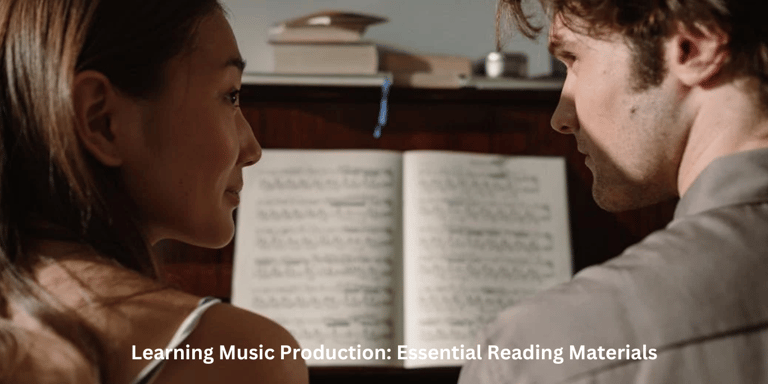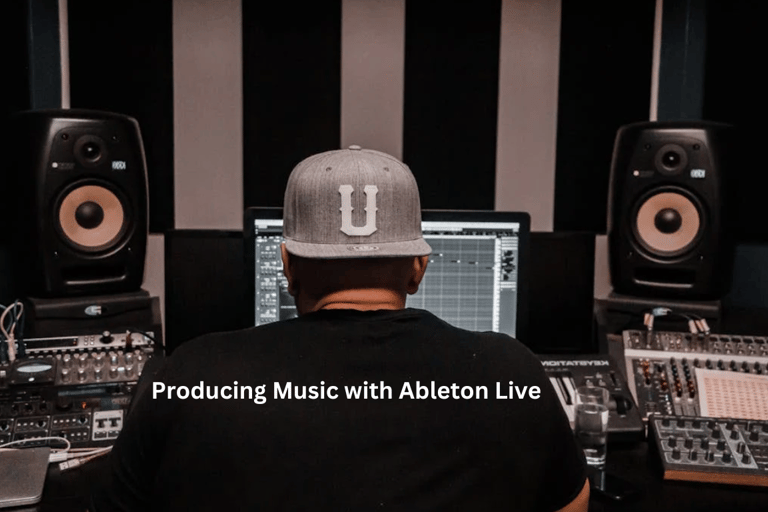Learning Music Production Essential Reading Materials
Materials to help and learn music production
1/12/20254 min read


Learning Music Production: Essential Reading Materials"
Introduction
The fastest way to advance your music production is through books and educational resources that address the craft's technical and creative aspects.
This article talks about the essentials you need to read to enable you to become proficient in music production. The skills you would learn from studying these books will arm you with all the insights on music production theory, software, and techniques that will give you the skills to produce great tracks in record time.
1. Understanding Music Production: Key Concepts and Skills
Before going on with the best books on music production, it's imperative to be introduced to the basics of the domain. Music production comprises various steps that need different kinds of knowledge and expertise. The key areas are described below:
Songwriting and Composition: Songwriting and composition are the art of writing and arranging music, which involves creating melodies, harmonies, and rhythms.
•Sound Design: Making unique sounds using synthesizers, samplers, and audio manipulation.
•Recording: Audio recording of instruments, vocals, or other sound sources through microphones and recording devices.
•Mixing: Balancing the levels, panning, equalization (EQ), and adding effects to each track to achieve a cohesive and polished sound.
• mastering is the final production stage, in which the mix is optimized for playback on various systems and formats.
An excellent read for those trying to get into production, The Mixing Engineer's Handbook exposes you to everything there is to know about mixing. This book teaches from setting levels to applying EQ, reverb, and more-it covers exactly how to mix. It guides how to combine different genres and how to approach mixing different types of instruments and vocals.
Key Features:
•TIPS AND ADVISORS FOR BOTH FRESH BEGINNERS ENTERING THE FIELD AS WELL AS EXPERIENCED PROFESSIONAL ENGINEERS
•THOROUGH COVERAGE ON THE ART OF MIXING
•HELPFUL INTERVIEW WITH THE CREME DE LA CREME FROM THE INDUSTRY
• COMMON MISTAKES SUCH THAT NOT DOING IT
Why You Will Love Reading This
Mixing or in broader words, production, is essential enough. From time-tested successful techniques, solidly effective practice provides professional, flawless mixing to sound no matter how terrible or the worst type the song might seem.
2. Music Production: A Handbook for Producers, Composers, Arrangers, and Students by Michael Zager
Indeed, music production by Michael Zager falls among the best books anyone should read to discover the technical and artistic side of music production. The book covers everything entirely, from recording simple sounds to advanced production techniques. However, you may use your creativity with your equipment and software to make the sounds you want.
•It covers everything comprehensively, covering the whole production process.
• How-to guides on the application of music production equipment.
• Case studies and implementations.
• Knowledge of producing in the various genres.
Why You Must Read It:
Electronic Music: Theories, Tools, and Techniques is a book for all creators interested in electronic music. It elaborates on the whole production process, dealing with synthesis, the application of digital effects, and theoretical topics of electronic music. Reading this would give a better vision of the whole genre.
Features:
Overview of electronic music theory and technique.
Information on using synthesizers, sequencers, and electronic music tools is available.
Discussion concerning the creative process with composition for all electronic genres and pragmatic suggestions towards creating an electronic musical piece that does speak to people.
Why You Should Read It:
It is an excellent source of technical information for those who decide to focus on creating electronic music. It is also one of the recommended texts for those who love electronic genres such as house, techno, trance, and dubstep.
4. "Producing Music with Ableton Live" by Brian Jackson
Amongst the most sought-after DAWs used today by music producers is Ableton Live. Brian Jackson's Producing Music with Ableton Live provides the perfect guidance to learn how to use this software. Whether beginner or experienced, this book has practical advice about creating, editing, and mixing tracks within Ableton Live.
Key Features
•How to make loops and beats with the help of the software for melodies.
•Basic mix and mastering techniques with the help of Ableton Live
•Tricks on how to deal with the internal effects and instruments through Ableton
Why Read:
Ableton Live is an ultra-intuitive DAW used by most professional audio engineers worldwide. A book like this one will help you use this software to your full potential and start making top-quality music immediately.
One of the best books out there about mastering the art of mixing is, in fact, The Art of Mixing by David Gibson. It's a great book on mixing that breaks all its complexities down into visual diagrams and easy principles one can use with a producer for someone wanting to get to the mixing part of the track for the first time.
Key Features:
•Concepts and techniques on mixing visualized.
•Deep diving into EQ, compression, reverb, etc.
•Tips for genres.
•Step-by-step workflows for the workflow of mixing.
Why You Should Read It:
Book: This is a visual guide that would be easy to follow. If you mix vocals, drums, or instruments, this book will help you take your mixes to the next level.
3. Online Resources and Forums for Music Production
There are also many online forums and communities where you can learn from experienced producers, share tips, and get feedback on your tracks.
•YouTube Tutorials: Channels like ADSR Music Production Tutorials and Point Blank Music School offer free video lessons on everything from sound design to mixing techniques.
•Reddit:Subreddits like WeAreTheMusicMakers and AudioProduction are great for networking with other producers and finding inspiration from others.
• Experiment with DAWs: Work with different digital audio workstations (DAWs) to become comfortable with the available tools.
•Remake Tracks: Try to remake a song you like. Listen for the structure, instrumentation, and effects used in the track.
•Work with Other Artists: Work with other artists to learn something new and widen your scope of knowledge.
•Mix Your Tracks: Practice mixing your tracks to develop your ear for balance, EQ, and spatial placement.
Conclusion:
Combining your reading with hands-on practice will give you the technical skills, creativity, and confidence needed to produce professional-quality music. Whether making it for fun or pursuing a career in music production, the proper knowledge and practice will ensure your success.







